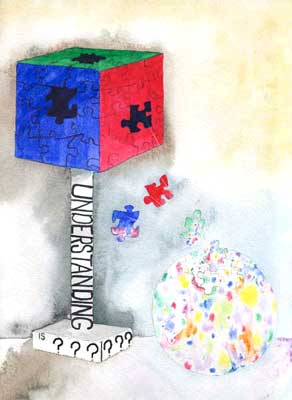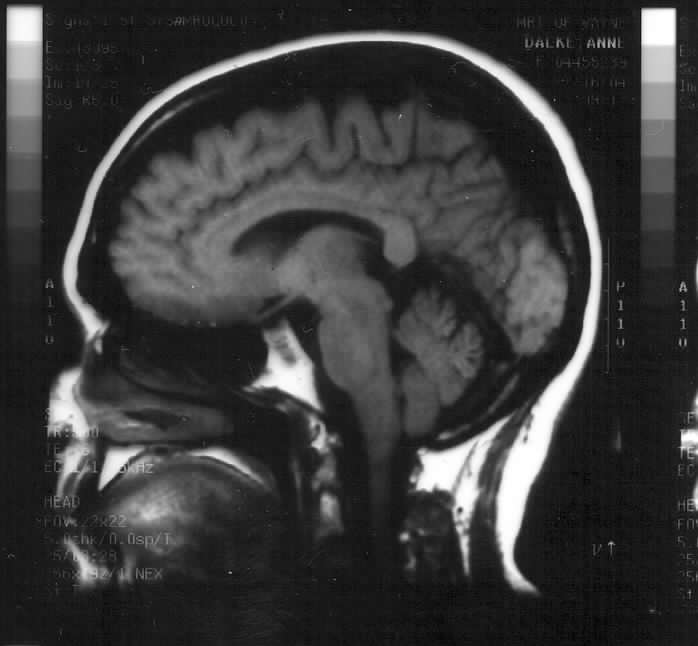"Centering
on the Edge: Intellect, Spirit, Action"
Friends
Association of Higher Education
Haverford College
June 16-19, 2005
"The Grace of Revision":
Making Community in Public
Anne Dalke
Friends Association of Higher Education
Haverford College
June 16-19, 2005
"The Grace of Revision":
Making Community in Public
Anne Dalke

This and all other images from the Watercolors of Sharon Burgmayer
Wade in the water, children,
Wade in the water,
God's a-gonna trouble the water.
Well out of the mountain come fire an' smoke
God's a-gonna trouble the water
Jehovah nobody be he could've spoke
God's a-gonna trouble the water.
Wade in the water,
Wade in the water, children,
Wade in the water,
God's a-gonna trouble the water.
Well, I'm walkin' down the highway an' the water's gettin' low
God's a-gonna trouble the water.
Walkin' down the highway, nowhere to go,
God's a-gonna trouble the water.
But it's wade in the water,
Wade in the water, children,
Wade in the water,
God's a-gonna trouble the water,
God's a-gonna trouble the water,
God's a-gonna trouble the water.
Why would you want to do that?
I'm inviting you to walk with me into some troubled waters....
(From the Thursday evening plenary:)
"I am a great appreciator of academic freedom, through the experience of its opposite."
"Unfortunately, I am now a lesson to frighten other intellectuals."
What do you see,
Why would you want to wade in troubled waters?
Why would you want to invite the children to?
Why would you (want to?) sing about their doing that,
early on a Saturday morning?
when you look @ this painting?
Sharon Burgmayer's commentary focuses on the symbolism of the "brokenness" of a thing serving to support another....: the broken iris flower supports a frog, the broken branch supports the turtles, another broken tree branch supports the human...with a decidedly dejected, sad, broken spirit..... The painting, she explains, alludes to John 5:1-4 ("an angel went down...into the pool, and troubled the water: whoesoever then first after the troubling of the water stepped in was made whole of whatsoever disease he had...."). Thornton Wilder uses this idea in his play, The Angel that Troubled the Waters, where a physician, disappointed at coming late to the pool, is asked, "Without your wound where would your power be?" Sharon painted this physician, in "The Pool at Bethesda."
According to Rick Hamilton, a colleague in Greek, "troubled" is tarasseto, a common word for stirring up, muddying. Classical uses= stir up the sea or earth, agitate the mind, throw an army into disorder, cause bowels to relax (!), stir up political disorder. Passive forms in the New Testament mean "be troubled, agitated, frightened, intimidated."
to hear others' glosses on the painting and the terms behind it?
To hear the artist's explanation of where it came from,
and what she was doing with the image?
To hear the etymology of the words which first stirred her?
Did learning these things make any difference
in your experience of the painting?
Anyone want to re-paint it differently?
Let's experiment with another one....

What do you see,
when you look @ this painting?
Sharon's video describing Understanding's Birth
As she said to students a few years ago, on the course on-line forum: This movie gives one story, the first story, of the painting's "birth". In the original story, I "saw" the pieces moving in one direction only.... You, and others with whom I have shared the painting, have told subsequent stories that have multiplied the dimensions of "understanding" that can be
extracted from it. From these stories I, too, now appreciate the ambiguity of pieces moving in both directions. How you see it depends where you are. (Not unlike life.)
I and a co-teacher, Paul Grobstein, frequently use Sharon's paintings in our first year writing seminars as a source of experiences that are more direct and less mediated than those provided by texts. Students have immediate responses to images: they find themselves more easily able to "read"them--a reading that the rest of the class (and the artist herself) can complicate and build on.
Sharon wrote again on-line, to another class of students who were outraged that Paul and I had asked her to revise the painting (removing the words, so that the readings would be less "directed"): I am amazed as I peruse your readings of my painting and see how its interpretations are seemingly endless. Having had many other paintings used by Paul and Anne in their courses, I never quite get used to the experience of having one of my paintings, whose meaning seems so nakedly obvious to me, interpreted by others in entirely different ways! "Understanding is..." was painted at the beginning of period of conscious struggle--no, that's too feeble--revolt against reason and rationality. As you might imagine, that's quite a disorienting step for a scientist. Hence the fluid swirls in the sphere. But mainly, the image was to illustrate the destruction of reason to produce something I dearly loved, colors, lots of colors, symbolic of life's richness....I can well remember how I felt when I replaced the original text with the question marks: I felt physically ill. Why did I agree then to make the change? (this is the interesting part to me) I think because I did not yet value my work as art, nor did I see myself as an artist. Was it worth the change? Perhaps, because its experimental use in this course would eventually generate more paintings and more discussions in other courses.
listened in on a prior conversation--
what do you now see in the picture?

Any one want to re-paint the picture?
What just happened here?
There is a theory--a theology--behind this practice,
drawn from current neurobiological explanations of
the plastic, bipartite nature of the brain--
which seem to me quite congruent with our
Quaker understandings of the rich resources of Spirit.
(At Friday morning worship:)
"The Christ-yoke is not a transaction. It is an invitation into a relationship."
"It is not a yoke of new boundaries, where we make new insiders and new outsiders."
We are invited to be humble learners. Despite how much we know, or think we know, we are asked to know more."
"May we be open."
Each of us
- has a distinctive individuality,
- an infinite capacity to create--and to revise--our sense of self and world,
- a great deal of randomness and unpredictability in "what goes on within,"
- and is continually changed by our interactions with the world.
I'm struck by parallels between "the grace of
revision" and "continuing revelation"--being open
to the unconscious, to the spirit, being willing
to take risks, not to be mired in dogma and
concretized ways of thinking and teaching and
learning. (Kaye Edwards)
Or, in the language of neurobiology (courtesy of Paul Grobstein, "The Bipartite Brain):
our internal organization consists of two parts which work differently
- emotions/thoughts/experiences/stories all happen "upstairs," in the neocortex,
where all internal experience (=feeling AND thinking) takes place - what goes on below (in the "frog brain") is everything else (="being").

The spiritual/neurobiological unconscious can handle many variables simultaneously, gives quick responses, and has a direct relation to pain and pleasure. It is "comfortable" with bits and pieces lying around with no global order--and so much more likely to provide "grist" for interesting, productive, open-ended conversations. | |
| Consciousness (highlighted in all academic work) is slower, more deliberate, more coherent, seeks causal relations and is more able to defer immediate judgment (that's where free will comes in: we don't HAVE to do what we FEEL like doing...!) |
 |
What this means, at a place (like Bryn Mawr) which prides itself on offering a rigorous education, is that students defer interminably, are particularly hesitant to speak out in class, afraid that they will "get it wrong" and so be publicly corrected...
 |
 |  |
- So: I try to make each of my courses into a game, a space of structured play where, if such deliberative self-censure happens less frequently, we can arrive at some unexpected places, worth examining.
- A significant extension of the classroom is an on-line forum, a playful space "inbetween" conversation and formal writing which allows students not only to revise one another's thinking-while-in-process, but also to become aware of their own.
- Being able to see themselves think aloud on web-based forums prods students to acknowledge the importance--after years of having it educated out of them--of saying "I," claiming what the Self knows.
- Being able to see their classmates think aloud together on web-based forums prods students to acknowledge their usefulness to one another's thinking, the usefulness of many Selves to One Another.
- The whole process demonstrates how infinitely revisable are both Thoughts and Selves.
(From Friday morning plenary:)
"Emerson once said that what he wanted from lecturers was first-hand experience, not second-hand news."
"Quakerism became the exemplar of the universal religion of first-hand experience, intent on finding a direct way to a personal meeting with God."
"This is about a double affirmation: Solitude and society. Mysticism and social action. Retreat and democracy. Individual epiphany and institutional transformation. The Inward Light and the obligations of the Beloved community. Spiritual growth and the social gospel. Prayer and pickets."
Biology/English 223: The Story of Evolution and The Evolution of Stories
 | Becky: The teaching in this course was so refreshing, and it made me see that I can learn not only facts and concepts, but also how to think in a new way. I enjoyed the openness of learning from each other through discussions and forums. I didn't feel like I was being fed a set of information to retain until the exam and subsequently forget. Not that the content of the course wasn't important-- without thought provoking (dangerous!) material, we wouldn't have had the basis for the learning and exploration that took place. However, I do feel that what I got the most out of was ...the group learning, the push to beyond what is easy and comfortable to grasp and talk about. |
 | Ghazal: I'm primarily used to the lecture-style of class, where class participation is only in the form of "i don't understand that equation" or "can you explain this concept?" It was nice that so much of the discussion and the direction of the class was driven by the students. I kept thinking that this course must be so interesting for Anne and Paul because every year is so different.... It really felt like everyone played a role in the class--there were the humanities majors, the science majors, classics experts, the talkers, the listeners.... our class seemed magnified in that respect because so much weight was placed on the students.... I'm glad that I wasn't comfortable the entire time we were in class. I don't mean that class was painful in any way, but I feel that I was asked to examine things that I otherwise wouldn't have....I feel like if we compare the class as a whole from the first day to the last, we can trace our own evolution....I feel more open-minded, now, than I did on the first day of class, and I want to continue down this path to see where it will take me. |
 | Eileen: Biology and English were sometimes hard to hard to reconcile, in their distinctive form and conent, as well as the expectations we all bring to how study of particular topics should be. They often found their middle ground in the thinner oxygen above human-sized things, in the mental space of philosophy and metaphysics, a place where time is more open to interpretation and life is seen with an inward eye from the distance of mind travel...the burden of freedom, of being told to make something new, given the admittedly disparate topics addressed, analyzed, discussed between teachers and students. Not to say Paul and Anne didn't give guidance and shape, because they did, but the feeling that each semester the class is reborn under the influence of every member of the discussion gave the unique pleasure that only influence can. It's funny to think that such a genuinely democratic classroom, continually reconstituting itself, is what some make fun of as a relic of overly student-conscious educational theory. Open and interdisciplinary classes like this one are more interactive, require more of all involved....The ruling atmosphere of revision and flexibility was refreshing, a breather from the usual. |
 | Michael:... most of my thoughts now center around how much I liked the open-ended multi-disciplinary approach of this class, and whether or not that exists in other disciplines.... It was very unique and refreshing to be able to just study ideas instead of being straight-jacketed in a specific discipline's bias and preferred writing style .... I also wonder if courses like this don't have a certain level of dangerous insurgency, in that they make it clear that courses can be taught with multiple professors in unconventional formats that force both teachers to stretch the limits of their own field's understanding and to confront ideas themselves, stripped of most discipline-centric pretension. Its probably a scary thought to teachers...was very expensive, involving more different faculty members, it shook up people's ossified lesson plans, and it shook up the very firm foothold many pre-tenured academics like to hold upon their field of specialization. I guesss at the end it wasn't only what we studied in this course but really how we studied it and all the unique ways in which learning was encouraged that will really stick with me, and I hope to be able to take a part, albeit sometimes a small one, of this course's philosophy into other fields because I think there are pockets of resistance like this across college campuses that are encouraging a resurgence of a sort of "intellectual history" type program that our colleges, and moreso our modern specialized economy and philosophy, really needs. If anyone knows of any similiar/other courses in the same vein, give me a heads up. |
"Notes" here:
fear of the potentially negative outcomes of public conversation/democratic process
Note also the concerns
=need for assurance that "all will be well" in the end?
=need for Quaker belief in "that of God"?
How you all manage to discuss those intimate beliefs, dreams, experiences every week in class and on a public forum makes me want to cringe. i do admire you all for doing it though, to me it seems as though you're willing to put yourself out there on the line every day. that takes guts and a belief in the goodwill of humanity and life which i am more cautious about. (from a student who withdrew from a new course on "Beauty")
or of any particular level of education. Just that the more people willing
to talk frankly and freely with one another, about how they experience the world...
the more we all can grow and learn.
I didn't find my own students included in this very well. They are just not that sophisticated.... They are puzzled. They want to know the right answer....I do actually think the web approach serves these students, too...could you open up your range as you consider the question?...I would enjoy an example or two of the sort of conversation / discovery you are referring to, examples so compelling that I want to jump in myself right now, and so generally enticing that I can imagine my own students venturing forth onto these waters. (Barbara Dixson)
what might be key in some educational contexts is the
shared task of producing something tangible, such as
A Handbook for the Theory and Practice of Extra-Classroom Teaching.
 |
For Barbara and her students: Empowering Learners: Theory and Practice of Extra-Classroom Teaching "There's a crack in everything, that's how light gets in .... Key in any educational context is exploring the crack--the cultural background, personal temperament and individual creativity--of each student, through which light shines. This doesn't imply that the topic/assigned project of the course need be "gaining new understandings of myself." (As David Ross said, "I don't see the pleasure in introspection. I find my self far less interesting than the policy debates and challenges that face the world.") But it DOES imply
|
is a song about exploration of a particular kind--
which leads to the making of a community of a particular kind:
one that is open, porous, labile, willing to be tested,
willing to test, in conversation, any and all presumptions,
refusing ever to stop or "close" the conversation
around any agreed-upon position--
including any litmus test of what constitutes "community."
Such a song has three keynotes:
the original relation each of us has (can have!) with ourselves/our unconscious/Spirit
as a rich reservoir for knowing
 |
(In Friday morning small group discussion on the texts of Douglas Steere:)
"Scholarship is incarnational."
"Douglas Steere was expansive: while putting his pipeline out in the world, he was drilling his well."
"To witness is to be really who I am, where that is unexpected."
"We don't have the luxury of not witnessing. Everything we do is a witness."
"There is a thin line between witnessing and imposing."
"Our witness is continuing revelation. Claim the power to define yourself."
"I get it right some of the time." |
the original relation each of us has (can have) with other knowing (and unknowing!) selves
"We're expanding the circle."
"When the Holy Spirit speaks to one heart, it speaks to two."
"Don't overgeneralize."
"If you can't say something simply, don't bother. Go home. It's rude to my ears."
"Write at a level that most people can take in."
"How to find a voice that seems adequate?"
"Not to say I don't have good days, occasionally--but often I feel that I have failed to communicate."
"8.4 people, on average, read each academic journal article that is written. It seems a waste of time and energy."
"Academics are talking too much to themselves, not looking at the world."

 | "Why should not we also enjoy an original relation to the universe? Why should not we have a poetry and philosophy of insight and not of tradition, and a religion of revelation to us, and not to the history of theirs?"(Ralph Waldo Emerson, "Nature") |
Margaret Fell reports on "a debate with clerics who were citing Biblical passages to support their claims," to which George "Fox retorted, 'You will say, Christ saith this, and the apostles say this; but what canst thou say?' Fell continues, 'This opened me so that it cut me to the heart, and I saw clearly we were all wrong. So I sat me down in my pew again, and cried bitterly. And I cried in my spirit to the Lord, "We are all thieves, we are all thieves, we have taken the Scriptures in words and know nothing of them in ourselves."'" (Mary Garmen, et. al. eds. Hidden in Plain Sight: Quaker Women's Writings 1656-1700. Reported by Steve Smith in "The Spiritual Roots of Quaker Pedagogy," Minding the Light: Essays in Friendly Pedagogy)
AND to do so with a willingness to revise, and be revised,
by our encounters with others.
...A professor, whom I admire and respect and whom I
want to admire and respect me, said in response
to my paralyzed fear of rejection as I approached
the project of writing...."You will never get it
right, but if you accept that and continue
anyway, then you can always revise your ideas,
come back to them later if you want. If you don't
write, you can't revise." I was struck by the way
this echoes, in a loose paraphrase, the way I
think about the notion of grace in relation to
faith. John Wesley, the founder of Methodism,
rejected "works' righteousness," arguing that the
grace of God is not given to human beings because
of the things that they accomplish or the
goodness of their character. He said, instead,
that humans must accept that there is nothing
that we can do to earn God's forgiving grace
because we'll never be able to deserve such a
gift through our own works, but that God gives it
anyway and all we must do is then accept it. In
so doing, we allow for the possibility of true
transformation.
In my faith life and my academic life, I hear
strains of the same things. My work will never be
perfect. There will always be something desirable
missing, but in accepting that, I accept God's
loving power in my life and my own power over my
work, each striving to create something new out
of the fragments that exist, each hoping for a
moment or two of transformation. That's grace.
That's revision. For the first time in a long
time, I feel that the two halves of my life are
not so distant from one another. The private
familial world of my faith constantly informs my
work and the public world of my academic life
works on my faith. In revision, I find grace
within the academy, and in grace, I find a chance
to re-envision the self, myself. (Rachel Wright,"Meditations on the Non-Existent 'I' in Text")
Next Steps....?
 |  |
Inverting Power Games, or
having the courage (foolishness?) to
use the web to build public community
- Is this actually a good thing?
- What new problems arise with the new capability?
- Given the technology, how does one actually make this happen?
- Are we willing to consider/talk about possible
dangers in what we are doing?
(In Friday afternoon sessions on the web and education:)
"My College tries to be Quaker. It struggles to be Quaker. Internally, we are clear, but financial pressures lead us to say that our being boldly Quaker is not what our students seek."
"I understand a Quaker college in terms of what happens when things break down."
"What do you mean by community on-line?"
"Community happens in other ways on-line: with less back and forth, interaction, but greater depth, more thoughtfulness."
"My students know I am slow to anger."
"You have to be mindful."
"There is no bridge across the river. We have to build the bridge."
"It was a different way of thinking."
Starting w/ these presumptions :
The disorder of the Web is one of its greatest virtues. As a fundamentally decentralized system of information exchange, it makes available, to a much greater degree than any prior human institution, the widest possible array of information/ideas/perspectives in a diversity of forms which, for the first time, approximates the diversity of human users.
The interactivity of the Web is perhaps its most important characteristic.
For the first time in human history, it
is becoming possible for all humans to play an
active role in world-wide cultural and
intellectual interchange. This means not only
that everybody's ideas/perspectives can be made
available, but also that people can develop their
ideas and perspectives in extensive interaction
with other people. (From Serendip's Evolving Web Principles)

|  |
One of its founders, Ann Dixon, said that she "used to think Serendip was about science." During the past few years, as she's seen its coverage expand to include both art and literature, she's found herself looking for a new way to describe Serendip's aim and scope. Its original "welcome" statement explained that
"Serendip is a gathering place for people who suspect that life's instructions are always ambiguous and incomplete. Originating in interactions among neurobiologists, computer scientists, business people, and educators, Serendip is both an expanding forum and a continually developing set of resources to explore and support intellectual and social change in education, in social organization... and in how one makes sense of life."
Seeing, through Ann's eyes, that the center of the website is its playground, and that the site, as a whole, is "about uncertainty," I can also see a connection between a) and b): because life and our understanding of it is always uncertain--and incomplete, the best way to "go about it" is [in]...
the process and productivity of ongoing and ever-revisable conversation...an open and constantly edited record both of the conversations we are having with one another and those we are conducting with ourselves, within our own heads....(The Grace of Revision, the Profit of "Unconscious Cerebration").
Conceived with an awareness that life is not a closed system, Serendip is a website that explores the pleasures and productivity of uncertainty, by facilitating connections among ever-expanding numbers of contributors.
...serendipity is a big part of our lives, but it grows in direct proportion to sociability."
(Elizabeth Bumiller, "If They Gave Nobels for Networking...."
The New York Times Week in Review. June 5, 2005. 4A.)
 In a traditional society, if we ask a man to name his best friends and then ask each of these in turn to name their best friends, they will all name each other so that they form a closed group. A village is made up of a number of separate closed groups of this kind. |  But today's social structure is utterly different. If we ask a man to name his friends and then ask them in turn to name their friends, they will all name different people, very likely unknown to the first person; these people would again name others, and so on outwards. There are virtually no closed groups of people in modern society. The reality of today's social structure is thick with overlap - the systems of friends and acquaintances form a semilattice, not a tree. |
I'm fascinated by what seems to be happening as a result of the creation of the space that is Serendip: an experiment in whether an (open? fragile? egalitarian? democratic?) community CAN be formed among people who begin less with a shared set of common beliefs (including any a non-negotiable sense of what constitutes community) than with a shared desire to learn, to go exploring.
The grace notes of my own experiences on Serendip
over the past few years, and of my argument for
why the web is such a profound resource for
contemporary education, are three: its

Some details:
- a key element is not setting the bar too high,
so anyone can get into the conversation
- a second is opening the
gates so that who counts as "expert" is
continually expanded by the recording of new
experiences
- the absence of in-the-flesh details
on the web open up space
for interesting, creative exchange not *bound* by personal responses
- our
engagement is
motivated by our own story-construction, so the
issue of its practical use-value quite neatly
resolves itself
- taken together, these internal externalized
conversations provide contributors with a profound sense--and a record--of ourselves as thinking, re-thinking, ever-revisable beings--which means: as actors in, and contributors to, the shaping and re-shaping of this world--and the next.
(In Friday afternoon sessions on the web and education:)
"There are many things you can't do completely any more."
"A community is simply a group of people who care more about each other than they need to."
"Why it's not that simple has important implications for all forms of community building."
"The non-synchronous web helps people get beyond the problems of trying to work synchronously."
"We fall into groups, with a fixed and narrow sense of our identities and interests. A synchronous community can lock us into that."
"What really matters is creating new ideas."
"This is a new thing: the information world to which people can gain access without going through someone else's gates."
"Posting on-line means sharing thoughts in progress--but we are afraid to leave an imperfect trace of ourselves there."
"The web casts the net more widely--it has an extraordinary capacity to locate people I'd like to work with."
|
Or create your own....?
Two on-line forums where you are warmly welcome to continue this conversation:
But first: in person? What canst thou say?
(From Friday evening plenary:)
"I should try and draw some conclusions from this, so we can open it for discussion."
"What is crucial here are the ethical and moral issues."
"I just want to know what the questions are."
"We can pummel. But Friends don't pummel."

